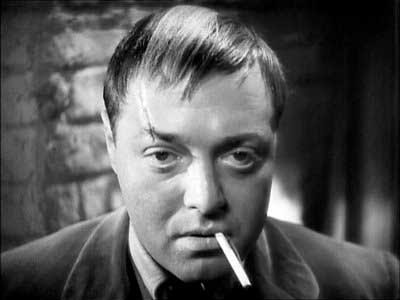The Man Who Knew
Too Much
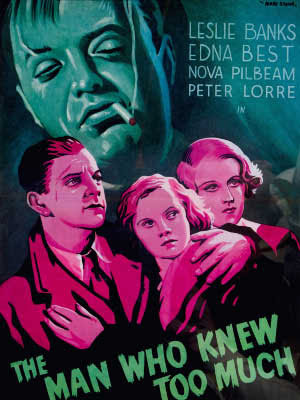
Director: Alfred Hitchcock
Year: 1934
Rating:
7.0
I expect a lot of Alfred Hitchcock fans, as do
I, think of this film as really the beginning of his career as the Master
of Suspense that would stick with him for the rest of his life. He had directed
some seventeen films before this (though that number is problematic since
he occasionally directed the same film twice in different languages), but
they were a mixed lot. He directed light comedies, melodramas, biographies
and a few crime films – Blackmail, The Lodger, Murder and Number 17. Most
of them were also silent film with Blackmail being released in both a silent
version and a talkie one. Blackmail in 1929 had been a big hit but since
then he had been in the doldrums and had left the studio British International
Films after Number 17 (1932) to direct an independent film, a biography of
the Strauss family and the rivalry between father and son. He called this
the low ebb of his career. Two contacts though were about to occur that were
to change that.
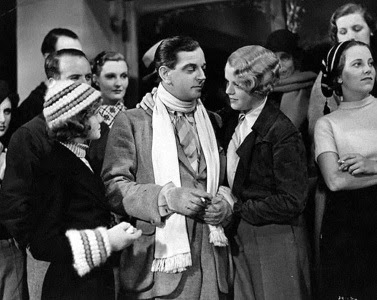
He bumped into Michael Balcon who had produced
Hitchcock’s first film The Pleasure Garden in 1925 for Gainsborough Pictures.
Hitchcock was 25 years old at the time. Balcon was to produce four
more Hitchcock films while at Gainsborough but now he had moved to Gaumont.
Balcon is one of the more fascinating characters in the British film industry.
First Gainsborough, then Gaumont, next the head of MGM – British and finally
the head of Ealing when they made all those wonderful comedies. Balcon invited
Hitchcock to come make a film and gave him a middling budget to do so. The
other person he became acquainted with was Charles Bennett. Bennett had been
the author of the play that Blackmail was based on and he and Hitchcock were
to become great friends and collaborators. He was to be the scriptwriter
on most of Hitchcock’s British films.

The two of them had been trading ideas for
a while and initially the script was going to be a Bulldog Drummond film
based on one of Sapper’s (H.C. McNeile) novels. There had already been a
Drummond film produced in 1929 starring Ronald Colman and two more were released
in the same year this film came out. Fortunately, they went off in a different
direction – to some degree influenced by a real event when a group of Anarchists
had a big shootout with the police – which is the last section of this film.
Instead, they made it into an international spy film – the first in a series
of films like that – the 39 Steps, Secret Agent, Sabotage, The Lady Vanishes,
Foreign Correspondent, Saboteur, Notorious and North by Northwest – all among
my favorite Hitchcock films. Hitchcock had become concerned about the rise
of Germany and Italy and the march towards war that he was witnessing though
I don’t think he ever named them in his films.

A family of father, mother and daughter
are vacationing in Switzerland when a murder brings them into the intrigue.
One of Hitchcock’s recurring themes was the innocent amateur who gets drawn
into espionage and murder – here it is an entire family. It begins pleasantly
enough – a ski competition that the daughter Betty (Nova Pilbeam – later
in Hitchcock’s Young and Innocent) messes up by running into the track to
save a dog – and then later a Clay Pigeon shooting competition that she messes
up by distracting her mother (Edna Best) allowing the hulking Ramon (Frank
Vosper) to win. The mother laughingly tells him she will win the next match.
Truer words were never spoken.
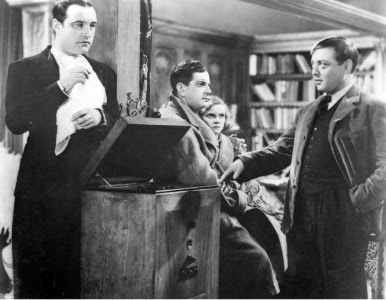
Later the mother and a friend of the family
are dancing and you might wonder what is going on between them when suddenly
a shot through the window kills him. It is sudden and shocking. His last
whispered words to the mother are, I am a British secret agent. I have a
paper hidden in a brush in my room. Deliver it to the British authorities.
And the MacGuffin is introduced into the plot. The husband gets the note
right ahead of the police but the daughter is kidnapped and he is warned
that if they say anything, she will be killed. Later they have to decide
whether to hand the paper over and stop a possible war or save their daughter.
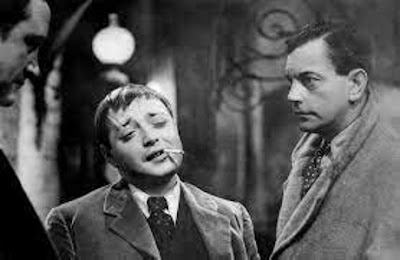
There are two very fine set pieces in the
film – the shootout at the end between the police and the terrorists - and
the concert scene in which Ramon is to assassinate a leader of another country
and start that war. Hitchcock does a great job of squeezing the suspense
out of the scene flashing between the assassin, the dignitary, the mother
in the audience and the symphony waiting for the clash of the cymbals, when
the shot is to be fired. The leader of the terrorists is the wonderful Peter
Lorre. His performance as the charming and ruthless killer is mesmerizing,
his cigarette always hanging limply out of his mouth, his hair combed down
menacingly, his eyes shifting back and forth between amusement and deadly
psychosis. This was his first English film after escaping from Hitler and
Germany. M had made him a star and Hitchcock wanted him. At the time Lorre
spoke no English he says. When he was interviewed by Hitchcock, he guessed
by his body language whether he should say yes or no. He is the star of the
film though not the main character.
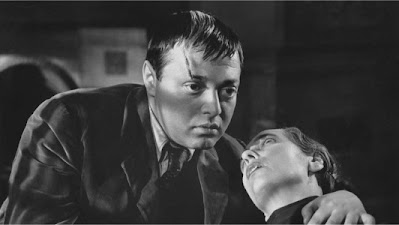
The film feels a bit rough now, much too
rushed with not enough time to care about the people. It runs for 75 minutes
while Hitchcock’s remake is 2 hours in length. He said at one time that he
much preferred the original and at another time, that he preferred the remake.
The two main leads don’t add much pizzazz to the film – earnest performances
but little charisma. In his next film Hitchcock solved all this. 39 Steps
is a classic, much smoother in its narrative and looks better – and of course
Robert Donat and Madeleine Carroll are perfect. This film though was a big
hit with the audiences – it felt new and fresh and Hitchcock never looked
back. The ironic things is that the man actually knows very little. The note
is just the MacGuffin but of little value.








